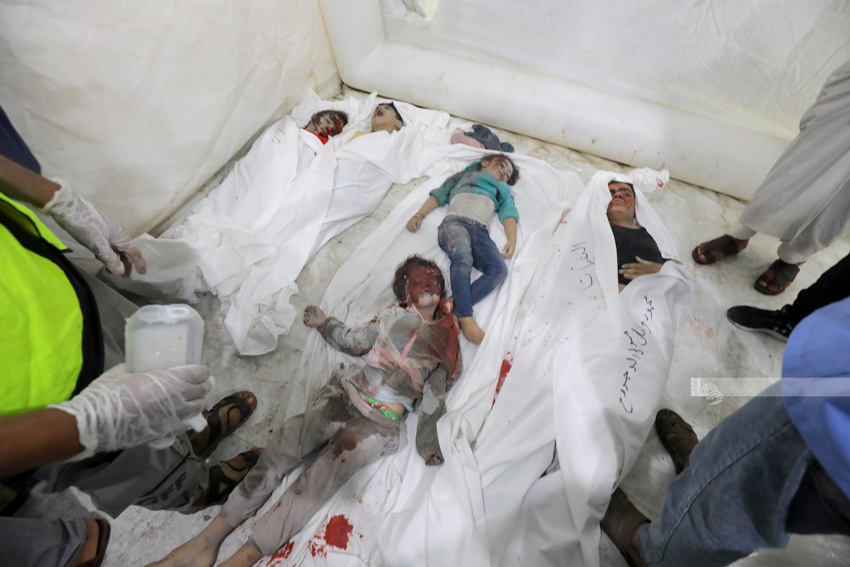PRESIDENT Mahmoud Abbas yesterday called on the UN Security Council to immediately stop the aggression against the Palestinian people, provide them with urgent international protection, hold an international peace conference, and move to a political solution instead of military and security solutions by implementing the two-state solution in accordance with international legitimacy.
During a meeting with French President Emmanuel Macron yesterday at the presidential headquarters in Ramallah, President Abbas called for a complete ceasefire, and the opening of permanent corridors for humanitarian relief to bring in medical supplies and food, and to provide water, electricity, fuel, and other basic needs to our people in the Strip, who are being subjected to barbaric aggression by the Israeli war machine.
Abbas held Israel responsible for what is happening today, stressing that the countries of the world also share the responsibility for encouraging Israel to continue with its aggressive practices against the Palestinian people without accountability or punishment, but rather gave it cover, protection, and the right to defend itself without paying attention to the bloody history of the occupation authorities and their successive governments.
The President affirmed Palestine’s commitment to international legitimacy and signed agreements, policies of non-violence and peaceful popular resistance, and following political and legal methods to achieve the national goals of the Palestinian people.
He also condemned the killing of civilians on both sides and called for the release of civilians, prisoners, and detainees on both sides.
President Abbas also stressed the rejection of the displacement of Palestinians from their homes and lands outside Palestine, whether from Gaza, the West Bank, or Jerusalem.
‘We ask everyone at these critical moments, and we appeal to you, President Macron, and the parties of the Security Council, to immediately stop this aggression against our people, provide urgent international protection, hold an international peace conference, and move to a political solution instead of military and security solutions, by implementing the two-state solution in accordance with international legitimacy, which ends the occupation of the land of the State of Palestine, with East Jerusalem as its capital.
‘The Gaza Strip is part of the Palestinian Territory occupied since 1967.
‘We reject any partial or security solutions for the Gaza Strip and adhere to a comprehensive political solution. In this regard, we call for the formation of an international coalition to make peace.’
Israeli military destroys 200,000 housing units and kills many children
THE Israeli military has destroyed nearly 200,000 housing units, either completely or partially, since the start of its latest assault on the Gaza Strip following Hamas’s surprise attack on October 7.
Mohammad Ziyara, the Palestinian minister of public works and housing, said yesterday the bombardment has ‘erased entire families from the civil registry’, as well as ‘neighbourhoods and residential communities’.
‘It also destroyed facilities, including hospitals, places of worship, bakeries, water filling stations, markets, schools, and educational and service institutions,’ Ziyara added in a statement.
Home to some 2.3 million people, the Gaza Strip covers a tiny area of 365 square kilometres (141sq miles).
According to the UN’s humanitarian office, at least 45 per cent of all housing units in the enclave have been damaged or destroyed in the Israeli attacks.
Among the areas hit the hardest have been Beit Hanoun, Beit Lahiya, Shujaiya, the neighbourhoods around the Shati refugee camp, and Abasan al-Kabira in Khan Younis.
An estimated 1.4 million people in Gaza have been internally displaced due to the relentless bombardment, with some 629,000 sheltering in 150 UN-designated emergency shelters.
Meanwhile, Israel’s total blockade on fuel entering the enclave is seriously affecting critical functions in all hospitals, risking the lives of at least 130 premature babies in incubators, 1,000 kidney dialysis patients who have had to reduce their treatment sessions, and front-line ambulance workers who cannot access the sick when the fuel runs out.
Since 2007, when Hamas came to power, Israel has maintained strict control over Gaza’s airspace and territorial waters and restricted the movement of goods and people in and out of the enclave.
• See editorial
